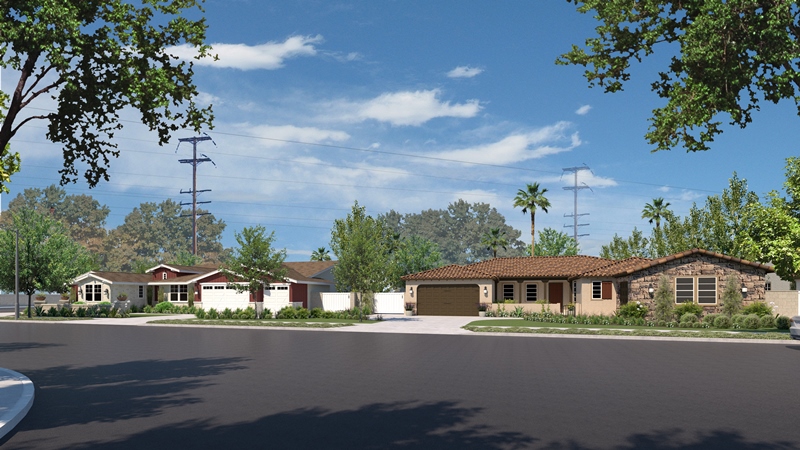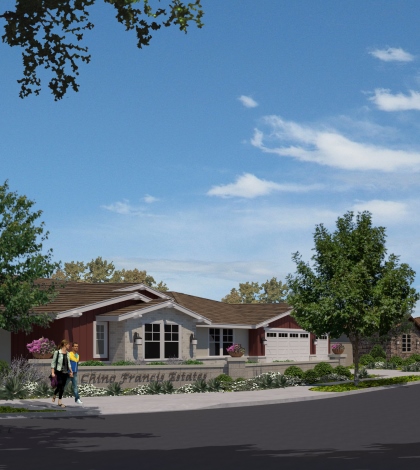Chino Francis Estates calls for the construction of 39 houses, all single-story. Last month, the project’s developer persuaded the planning commission to increase the project’s density. The city council is expected to consider the project in January.
In January, the Chino City Council is expected to vote on a housing development proposed for an unincorporated parcel that the city is considering annexing.
Developer Borstein Enterprises wants to build 39 single-family homes on 13.3 acres at the northwest corner of Francis and Yorba avenues, said Loren Borstein president of the Los Angeles-based company.
That parcel, on the Chino border, was once a rabbit farm but now is an ideal site for moderate-sized, one-story homes on lots that can be maintained without much difficulty, Borstein said.
“It’s rare in today’s market that you find a housing development that is exclusively one-story houses on large lots, but that’s what we’re going to do here,” said Borstein, whose company is developing the project under the name Chino Francis Estates LLC. “We originally proposed to build some two-story homes, but there was opposition, and we responded to that.”
Borstein Enterprises has developed or financed approximately 150 housing tracts in Southern California since the company was founded in 1980. It bought the Chino land – a former dairy site that is part of the city’s renowned agricultural preserve – for an undisclosed sum in 2016 from multiple owners.
Original plans called for Chino Francis Estates to have 47 lots on 12 acres, with predominantly two-story homes. But feedback from the neighborhood was that residents preferred single story homes..
Borstein Enterprises has spent much of the past three years negotiating with Chino residents and changed their site plan and product to accommodate all single story homes.
Besides the shift to single-story houses only, the developer agreed to several other changes, including infrastructure improvements, wider streets, a 15,000-square-foot public park and a density rate – 3.25 units per acre – that is below more than 80 percent of Chino’s residentially zoned property.
When the project reached the planning commission Nov. 19, it called for four and five-bedroom homes that would range from 2,280 square feet to 3,590 square feet, each with a three-car garage, according to the project’s website.
Chino Francis Estates will have an average lot size of just above 10,120 square feet. Construction is expected to start next summer, with first models available in the first quarter of 2021.
Prices will start in the mid-$700,000’s, Borstein said.
Planning commissioners voted 4-3 in favor of the project, following a sometimes contentious meeting attended by more than 100 people, including supporters and opponents of the proposed development, according to reports.
Commission members also recommended annexing the property, which is within Chino’s sphere of influence, and increasing the project’s density from two houses per acre to 3.2 houses per acre. This would be done by amending the city’s general plan, a change the city council must approve.
If it does, “The Chino Francis Estates project will be less dense than eighty percent of residentially zoned property in the city and offer attainable price points for prospective buyers” Borstein said.
“At two houses per acre, the price goes to $1.2 or $1.3 million due to the cost of fixed infrastructure upgrades,” Borstein said. “Not many people can afford that. What we’re proposing is going to be a lot more affordable,easier to maintain, and still offer large lots.”
The Inland Empire and California are undergoing severe housing crises: Not enough houses are being built, especially housing that middle-class buyers can afford.
California needs to issue 200,000 to 250,000 housing permits per year in order to keep up with annual job growth of two percent, yet it’s only issuing approximately 130,000 permits a year, according to the UC Riverside School of Business Center for Economic Forecasting.
Given that situation, any housing that gets approved is good news, said Carlos Rodriguez, chief executive officer of the Baldy View chapter of the Building Industry Association of Southern California.
More cities should follow Chino’s example and work with developers to make sure houses that people can afford get built, Rodriguez said
“We now have the state telling [municipalities] that they have to issue a certain number of housing permits per year to keep up with demand, and those numbers will go up in the next few years,” Rodriguez said. “The burden on cities to build more houses is only going to get stronger”
When asked regarding the likelihood of passage by the City Council, , Borstein said ““We think the council will recognize this is a good project that will significantly improve the neighborhood in north Chino” Borstein said. “The opposition to it was vocal, but it was a minority that was fed a lot of disinformation. The majority of city residents who really know the project support it.”

 IE Business Daily Business news for the Inland Empire.
IE Business Daily Business news for the Inland Empire.


